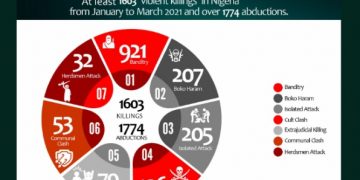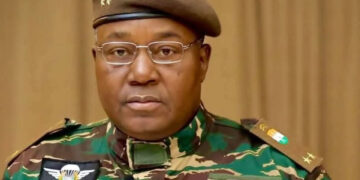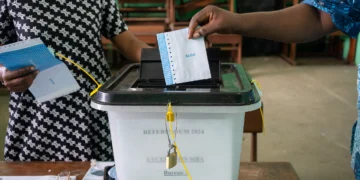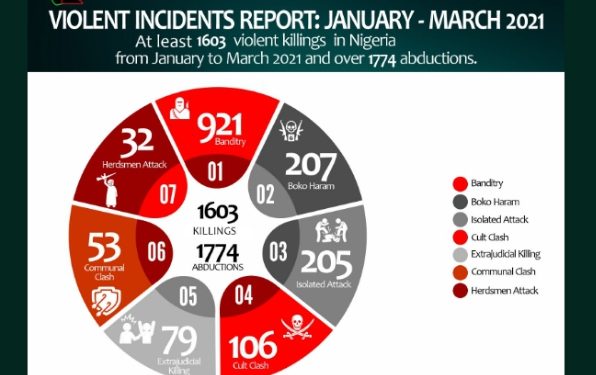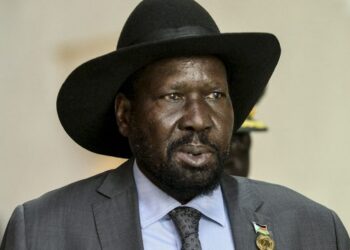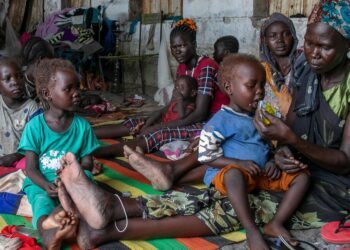In the first quarter of 2021, Nigeria continued to experience inordinately high numbers of armed violence across the country, with very high body counts. Our tracking shows that at least 1603 persons lost their lives to mass atrocities across the country from January to March 2021.
In January, unbridled violence continued to be documented across all regions of Nigeria, with at least 373 deaths linked to these incidents. Abductions nationwide, and pillage attacks in the North featured most prominently.
In spite of the recent #EndSARS protests against extrajudicial brutality and killings, deaths related to this form of atrocity continued. For example, five members of the Road Transport Workers Union were extrajudicial killed, and several others brutalized by state security personnel in Kwara state. In a public statement, the Commissioner of Police ordered a full-scale investigation into the crisis, however, till date, there have been no records of arrests or even identification of the perpetrators of this mayhem
Looking Forward
The numbers of lives lost in the first quarter of the year paints a dreary picture of the declining state of security and increase in human rights infractions across Nigeria. The country is clearly a fragile state, and remains vulnerable to combustion from several forms of atrocities. The question to ask is what are its government and citizens doing to stem the tide?
Land of Impunity
The Nigerian state’s penchant of covering multitudes of crimes with the blanket of impunity and amnesty does not augur well for the nation. Rather it has emboldened perpetrators to increase their activities and serves as a motivation for other actors to cash in on the monopoly of violence. Lack of trust in the government to ensure justice is also a motivation for reprisal attacks by aggrieved persons and communities.
It is instructive that in the hundreds of armed pillages that have occurred in the Northern region, and security agents have barely been able to make arrests, and there have been no prosecutions for these crimes. The same lens would apply to kidnaps, and communal conflicts.
Buying Peace
In spite of its continued denial, several sources have documented attempts by some state Governors to placate organized criminal groups – paying fat ransoms to kidnappers, and offering cashback to bandits in exchange for their weapons and assurance of security. However, it is pertinent to state that huge ransoms paid to kidnappers by the government sets a dangerous precedent that would encourage criminality rather than quell it.
Amotekun has also been implicated in committing gross human rights violations and extrajudicial killings. On January 15, the Oyo State Police Command confirmed the killing of a 21-year-old man, Tosin Thomas, by an Amotekun officer.
Across the country, other forms of attacks recorded were consistent with previous months: pillage of communities in the North, targeted and random abductions, and communal clashes. In particular, the North Central states, especially Kaduna and Niger states, the pillage of rural districts, kidnappings, and killings by bandits remained a recurring decimal.
Every region of the country contended with targeted and random abductions in this quarter. Whilst highway abductions by crime syndicates were peculiar to the North, and some parts of the South (South/West and South/South), we observed two cases of mass-targeted kidnappings of traders. In January, 27 traders were abducted in Etsako West, Edo. Similarly, 27 Kano traders were kidnapped on the Kaduna highway by gunmen who demanded N27 million ransom, N1 million for each trader.
The marked increase in insecurity across the country continued in February. At least six hundred and eighty-five (685) persons lost their lives to mass atrocities with Boko Haram accounting for the highest number of killings. The spate of attacks on communities in Southern Kaduna and Niger state also continued with an increase in mass kidnappings in Niger state. There was also an increase in the targeted abduction of school children in the North West of the country. Comparing these numbers with the figures for February 2020 mass atrocities report that documented at least 374 violent deaths, the spike in numbers of killings is alarming.
On February 17, gunmen, wearing military fatigues, stormed Government Science Secondary School Kagara , Niger State, Northwest Nigeria at about midnight and kidnapped 42 people, 27 of which were students. The abductees were released ten days later.
Later on in one month in Zamfara, 279 school girls were kidnapped overnight from Jangebe Government Girls’ Secondary School, when gunmen attacked the boarding school. Weeks before the kidnapping, lawmakers from Zamfara state had suggested offering amnesty to repentant kidnappers in exchange for sustainable economic opportunities.
Islamic State West Africa Province (ISWAP) attacked Nigerian police and army units in Magumeri, killed two police officers, and burnt their vehicle along the Maiduguri-Magumeri-Gubio Road. The next day the same group attacked a UN agency convoy between Karito and Monguno, of Borno State, Northeast Nigeria, kidnapping one person- making it the third employee of the United Nations in Nigeria abducted within the past two months by ISWAP insurgents. At least 10 officers of the Nigerian Army were also killed in an attack launched by Boko haram terrorists in the Marte Local Government Area of Borno State. 20 civilians were also killed by Boko haram insurgents in Dikwa, Borno State and in Maiduguri, Borno State at least 16 persons were killed by a Boko haram rocket attack. In Yobe State, 4 police officers who were protecting the Bayameri area were killed alongside 7 villagers during an attack by Islamic State in West Africa Province (ISWAP) members in the Bayamari area of the state.
An analysis of available data suggests that banditry related incidents accounted for about 57.5% of fatalities (921 of 1603). The most vulnerable states to this form of attacks remained Kaduna, Zamfara, Katsina and Niger States.
Kaduna state recorded the highest number of fatalities from this form of mass atrocity with at least 69 deaths in March alone. Thirty-four (34) were killed in Sokoto, Northwest; 23 in Niger, Northcentral region; 15 in Anambra, Southeast region; and 11 people in Zamfara, Northwest.
On March 5, in Tara village of Sabon Birnin Local Government Area of Sokoto state, gunmen attacked the community and killed 17 people. while On March 17, three soldiers and five villagers were killed by bandits in Kabasa village, Zamfara. The victims had been fighting off a bandit attack in Magami district, Gusau Local Government Area of the state. Between January and March 2021 data suggest that at least 207 lives have been lost to the unabating warfare.
In January this year, Boko Haram insurgents killed 7 persons (6 soldiers and 1 civilian) and abducted several others in a raid on Chibok town, Borno State. Relatedly, terrorists assailed a commercial vehicle in Nganzai, Borno State and killed at least 10 commuters. Interestingly, shortly after the new service chiefs visited Maiduguri, ISWAP attacked the Nigerian police and army units in Maiduguri, Borno State Capital. That attack led to the death of two police personnel, while their vehicle was burnt along the Maiduguri-Magumeri-Gubio Road. Boko Haram insurgents also raided a village in Konduga Area of Borno State and abducted 50 persons.
Recently in March, terrorists launched a wide range of violent attacks on humanitarian actors. On March 2, ISWAP attacked the military base and United Nations humanitarian hub in Dikwa, forcing aid workers to go into hiding.
ISWAP in this reporting period, had attacked the town of Dikwa 4 times. The first attack in February was met with resistance from the Nigerian army. In March, the town was attacked twice. On March 1, the fierce attack directly targeted the humanitarian assets and aid workers. The next day, another attack was launched by the Boko Haram splinter group in the same town. Dikwa hosts one of the military’s super camps, bases that often house weapons and soldiers in large sizes.
Organized criminal groups who maim people, rape women, destroy properties and cause severe humanitarian crisis should be made to face the wrath of the law rather than been patted on the back. The latest mass kidnapping from schools in recent weeks, calls to question the implementation of the “Safe School Initiative” which was launched with millions of Naira invested, after the Chibok girls were abducted to bolster security in schools in Nigeria’s north-eastern region of the country.
Nigeria’s perpetual battle against insecurity, is at a high cost, with both security operatives and civilians paying with their lives. That cost continues to be too high. According to S 14(2)(b) of the Nigerian Constitution, the primary objective of the government is to ensure the security and welfare of citizens. Despite the government’s claim of being on top of the security situation in the country, the spread and contexts of insecurity have metastasized and shown no signs of abating, despite the enormous budgetary allocation to security.
